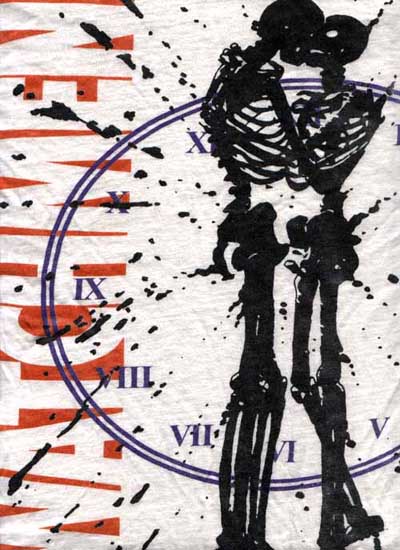But who watches the watchmen?
– Juvenal
To my shame, I must admit I have never read Alan Moore’s literary classic Watchmen, the graphic novel above all graphic novels, the book that is required reading in many college English classes, and the comic that made Time magazine’s 100 All-Time Novels. I totally lose nerd-points for never having taken the time to add such an important and influential work to my reading list.
 1986 Watchmen T-Shirt |
Last week I corrected this personal shortcoming. My plan was to read the book in a week, but, unable to put it down, I read it in a six-hour marathon session. All I can say is, WOW. I had previously read Alan Moore’s V for Vendetta and Promethea, the latter held my previous #1 spot for all-time-greatest graphic novel before Watchmen dethroned it.
Watchmen is a classic noir tale, opening with a murder, leading to a mystery, and a journey through a menagerie of classic noir archetypes. The psychotic killer, fem fatale, confidant, mobster, floozy, bad-cop, hard-boiled detective, and wealthy untouchable are all present and accounted for, only here they are all superheroes.
With one exception, Alan Moore’s superheroes do not possess super-human powers. They are merely athletes, inventors, or vigilantes needing costumes to protect them from the law. Watchmen takes place in an alternate history where the existence of superheroes has intensified the arms race between America and the U.S.S.R., where their intervention in Vietnam allows America to win that conflict, and allowed Richard Nixon’s re-election. The book is brimming with historical inside jokes, as when Robert Redford is mentioned as a possible presidential candidate, a character responds, “Who wants a cowboy actor to be President?”
I would consider Watchmen a fairly anti-superhero book, wrestling with the philosophical concept of valetism, hero-worship (“No man is a hero to his valet.”). Moore’s heroes are so humanly-flawed, like any authority, how can we imagine consolidating so much power in their hands?
Which of Moore’s superheros’ worldviews would we trust to care for us? Rorchack’s extreme social conservativism, Ozymandias’ extreme socialism, the Comedian’s nihilism, or Dr. Manhattan’s impartial omniscience? At the book’s conclusion, the characters are faced with a disturbing moral decision to make, but one that is brought about from all their meddling in the world.
Watchmen is a book that requires several readings to fully appreciate the complex characters, myriad plotlines, layers of symbolism tying everything together, and the depth of its philosophical issues, to which there are no clear answers. It’s a book about superheroes in the real world, and the good and the bad that comes of it.
A film version of the novel is scheduled for March 9th 2009, produced by Larry Gordon who has been working for 17 years to bring this novel to the big screen. It will be directed by Zack Snyder, whose previously directed the offensively bad film 300, and who I think lacks the emotional maturity to pull off Watchmen. A trailer for the film further squelches my enthusiasm, as it features all the stereotypical shots of people in costumes striking cool poses, which really goes against the spirit of the novel.
Comments
2 responses to “Required Reading: Watchmen”